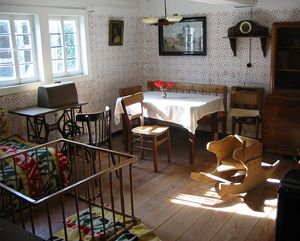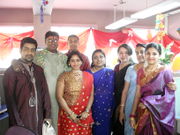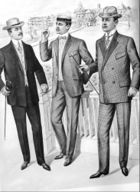Personal life

Personal life is the course of an individual's life, especially when viewed as the sum of personal choices contributing to one's personal identity.[1] It is a common notion in modern existence—although more so in more prosperous parts of the world such as Western Europe and North America.[2] In these areas, there are service industries which are designed to help people improve their personal lives via counselling or life coaching.[3]
Contents |
History

In the past, before modern technology largely alleviated the problem of economic scarcity in industrialised countries, most people spent a large portion of their time attempting to provide their basic survival needs, including water, food, and protection from the weather.[4] Survival skills were necessary for the sake of both self and community; food needed to be harvested and shelters needed to be maintained.[5] There was little privacy in a community, and people were identified by their social role.[6] Jobs were assigned out of necessity rather than personal choice.[7]
Furthermore, individuals in many ancient cultures primarily viewed their self-existence under the aspect of a larger social whole, often one with mythological underpinnings which placed the individual in relation to the cosmos.[8] People in such cultures found their identity not through their individual choices—indeed, they may not have been able to conceive a choice which was purely individual. Such individuals, if asked to describe themselves, would speak of the collective of which they were part: the tribe, the Church, the nation.[9] Even now, survival issues are still dominant in many countries and societies. For example, the continents of Africa and Asia are still largely mired in poverty and third-world conditions, without technology, secure shelter, or reliable food sources. In such places, the concepts of a "personal life", "self-actualization", "personal fulfillment", or "privacy" are largely unaffordable luxuries.[10]
The English philosopher, John Locke, was one of the earliest to discuss the concept of individual rights. In the 17th century, he promoted the natural rights of the individual to life, liberty, and property, and included the pursuit of happiness as one of the individual's goals.[11]
Personal lives today
.jpg)
The notion of a personal life, as now understood, is in part a creation of modern Western society. In the US, especially, privacy is highly valued. Since the colonial period, Americans have been noted for their individualism and their pursuit of self-definition.[12] Indeed, the two most famous American documents—the United States Declaration of Independence and the Constitution—explicitly raise the pursuit of happiness and the expectation of privacy to the level of rights.
In modern times, many people have come to think of their personal lives as separate from their work (see also Marx's theory of alienation). Work and recreation are distinct; one is either on the job or not, and the transition is abrupt. Employees have certain hours they are bound to work, and work during recreational time is rare.[13] This may be related to the continuing specialization of jobs and the demand for increased efficiency, both at work and at home. The common phrase "Work hard, play hard" illustrates this mindset. There is a growing trend, however, toward living more holistically and minimizing such rigid distinctions between work and play, in order to achieve the right work-life balance. In 2005 a new social movement was born coined "the Ultimate Lifestyle" which saw the emphasis purposefully shift from a person's focus on material possessions and wealth, to that person living a life focused on experience, personal development, the gaining of wisdom through experiences and an importance on building strong family relationships, while continuing to contribute to society.
The concept of personal life also tends to be associated with the way individuals dress, the food they eat, their schooling and further education as well as their hobbies, leisure activities, and cultural interests. Increasingly, in the developed world, a person's daily life is also influenced by their leisure use of consumer electronics such as televisions, computers and the Internet, mobile phones and digital cameras.[14]
Other factors affecting personal life are an individual's health, personal relationships, pets as well as his home and personal possessions.
Essential choices
Perhaps the two most important areas an individual must address when planning his personal life are those concerning the home and companionship. A number of decisions are required here:
The home

In selecting a home, the individual must answer a number of questions:[15]
- whether to live in a house, apartment or collective habitat on land;
- whether to live in a houseboat, apartment or collective habitat on sea;
- whether to live in a town or city or in a more remote area such as a village or the countryside;
- whether to live close to family and friends.
Companionship
Basic choices here include the following:[16]
- whether to live alone or with a partner or family;
- whether to plan a partnership or marriage with a view to raising a family.
In the light of the above, further personal choices will follow, often with the assistance of one's partner, on how the home should be furnished, how the garden, if any, should be set out, and how relationships with neighbours should be developed.
Leisure activities
The way in which individuals make use of their spare time also plays an important role in defining their personal lives. In general, leisure activities can be categorised as either passive, in cases when no real effort is required, or active, when substantial physical or mental energy is needed.[17]
Passive activities include watching television, listening to music, watching sports activities or going to the cinema. The individual simply relaxes without any special effort.
Active activities may be more or less intensive ranging from walking, through jogging and cycling to sports such as tennis or football. Playing chess or undertaking creative writing might also be considered as demanding as these require a fair amount of mental effort.
Based on 2007 data, a US survey on use of leisure time found that the daily use of leisure time by individuals over 15 averaged 4.9 hours. Of this, more than half (2.6 hours) was spent on watching TV while only 19 minutes was spent on active participation in sports and exercise.[18]
How life is interconnected

Many people give definition to their lives by clarifying their life purposes, and separating their actions toward the achievement of these into discrete strands:[19]
- their intellectual lives,
- their working lives (career planning),
- their family lives (family planning),
- their sex lives, and
- their spiritual or religious lives.
In the interim, those who can afford to pause may adopt a lifestyle or assess their quality of life. Exceptional lives may, at least in part, find literary reflection in a biography, an autobiography or a memoir. Some outstanding lives merit hagiography or a vita.
An individual who is inclined to be introspective may second-guess his or her life choices. One may be told by friends and acquaintances to "get a life"—in the sense of promoting fuller participation in socially approved activities, often outside the private sphere. More broadly, certain modern cultures, some defined by state or corporate agencies, encourage individuals to submerge the personal identity in a greater whole. Communism, capitalism or other totalizing ideologies, mass movements, and even sports fandom are manifestations of this phenomenon, though differing vastly in degree. In this way, the ancient sensibility, which viewed collective identity as more important than personal identity, is returning to prominence in contemporary life.
External influences on personal choice

While it is generally accepted that human beings enjoy the capacity of free will, different schools of philosophy put forward a range of interpretations on how far the individual can in fact assert his own choices.[20] It is also argued that free will can be significantly influenced by morality or moral responsibility.[21]
In practice, personal choices are often influenced by the environment in which a person lives (i.e. his family, social status and geographic surroundings), by his national language and culture (sometimes including the national constitution, form of government or religion) and by current developments in fashion, technology, sports and social programmes.[22][23]
In many industrialised countries, there has been a steady increase in the proportion of people living alone.[24] This may result from the need young people experience to leave home while studying or seeking work, from stress at work, from divorce or from the death of a partner or spouse. In the United States, almost one fourth of households are occupied by a single person and the percentage is even higher in the UK.[25][26]
Personal contentment

While little research has been undertaken on personal life as such, a number of recent country-by-country surveys have centred on personal contentment or personal satisfaction. The 2008 World Values Survey found that freedom of choice and tolerance were among the factors individuals appreciated most while in 2006, a University of Leicester comparative study of a number of surveys on happiness concluded that factors such as education and health care were as important as wealth.[27][28] Denmark came first in both surveys whereas Zimbabwe and Burundi were among the lowest.
The 2009 OECD study on Society at a Glance devoted special attention to Measuring Leisure in OECD countries. While there are clear differences between the results for each country, by far the most popular use of leisure time was watching television followed by the pursuit of a wide range of hobbies and pastimes. Turkey stood out as the country where most time was spent on entertaining guests whereas France was the country where individuals spent the most time on dining. Time spent on personal care was also an important factor in most countries.[29]
See also
- Personal identity (philosophy)
- Identity (social science)
- Human condition
- Human ecology
- Leisure
- Life (disambiguation)
- Lifeworld
- Maslow's hierarchy of needs
- Physical quality-of-life index
- Purpose
- Quality time
- Real life (reality)
- Recreation
- Work-life balance
- Personal finance
- Reality
- Simple living
- Henri Lefebvre
- Michel de Certeau
References
- ↑ Maureen Baker: Choices and Constraints in Family Life. Oxford University Press. Retrieved 4 October 2009.
- ↑ Modern lifestyle from Phuong – Maruko. Retrieved 4 October 2009.
- ↑ Williams, Patrick (2007). "The history and evolution of life coaching". Therapist as life coach, an introduction for counselors and other helping professionals. W.W. Norton & Co. (New York). http://www.lifecoachtraining.com/resources/articles/articles/The_History_and_Evolution_of_Life_Coaching_ch2.pdf
- ↑ Van Loon, Hendrik: The Story of Mankind. Electronic Text Center, University of Virginia Library. Retrieved 4 October 2009.
- ↑ "Origin of agriculture and domestication of plants and animals linked to early Holocene climate amelioration", Anil K. Gupta*, Current Science, Vol. 87, No. 1, 10 July 2004
- ↑ Barnard, A. J., ed. (2004). Hunter-gatherers in history, archaeology and anthropology. Berg. ISBN 1-85973-825-7.
- ↑ Why did anthropologists get interested in peasants? from ERA, Centre for Social Anthropology and Computing, University of Kent at Canterbury. Retrieved 5 October 2009.
- ↑ Percy, Walker. Lost in the Cosmos: The Last Self-Help Book. New York: Farrar, Straus, and Giroux, 2000. pp. 109–112. (see also the discussion of how this contrasts with contemporary life, on the following pages)
- ↑ Collectivism vs. Individualism. From Freedom Keys. Retrieved 5 October 2009.
- ↑ A. H. Maslow: A Theory of Human Motivation, from Classics in the History of Psychology. Retrieved 5 October 2009.
- ↑ Short biography of John Locke by Thomas K. Hearn, Jr. Retrieved 6 October 2009.
- ↑ Alexis DeTocqueville: Democracy in America. Retrieved 6 October 2009.
- ↑ Compensation and Working Conditions Online. U.S. Bureau of Labor Statistics. Retrieved 5 October 2009.
- ↑ Netbooks Propel Global Semiconductor Sales from PC World. Retrieved 5 October 2009.
- ↑ How to Find the Right Home. From About.com. Retrieved 6 October 2009.
- ↑ Dr. John Harvey: Psychology of Interpersonal Relations. University of Iowa. Retrieved 6 October 2009.
- ↑ Robert A. Stebbins: Choice and Experiential Definitions of Leisure. University of Calgary. Retrieved 6 October 2009.
- ↑ American Time Use Survey. Leisure and sports activities. U.S. Bureau of Labor Statistics. Retrieved 8 October 2009.
- ↑ Personal Goal Setting. Mind Tools. Retrieved 5 October 2009.
- ↑ Free Will. Stanford Encyclopedia of Philosophy. Retieved 8 October 2009.
- ↑ Ted Honderich: Free Will, Determinism, and Moral Responsibility – The Whole Thing in Brief. University College London. Retrieved 8 October 2009.
- ↑ Leisure – Family's Influence On Leisure. Marriage and Family Encyclopedia. Retrieved 8 October 2009.
- ↑ Young People Spend More Spare Time on Art Activities. Chinanews.cn February 28, 2007. From China.org. Retrieved 8 October 2009.
- ↑ Number of single person households increasing despite rising rents and high house prices. InfoLink Australia. Retrieved 8 October 2009.
- ↑ Herbert Anderson, Freda A. Gardner: Living Alone. Retrieved 8 October 2009.
- ↑ One-person households up to 30%. UK National Statistics Online. Retrieved 8 October 2009.
- ↑ Rating Countries for the Happiness Factor. Business Week, October 11, 2006
- ↑ Survey Says: People Are Happier. Business Week, August 20, 2008.
- ↑ Special Focus: Measuring Leisure in OECD Countries from OECD's 2009 study on Society at a Glance. Retrieved 6 October 2009.
Further reading
- The Psychopathology of Everyday Life (1901) – Sigmund Freud
- Critique of Everyday Life (1947) – Henri Lefebvre
- The Revolution of Everyday Life (1967) – Raoul Vaneigem
- The Practice of Everyday Life (1974) – Michel de Certeau
- The Everyday Life Reader, 2001, edited by Ben Highmore. ISBN 041523025X
- English Life and Leisure. A social study., (1952) – Seebohm Rowntree
- Ways of Living: Work, Community and Lifestyle Choice (2009) – Paul Blyton, Betsy Blunsdon, Ken Reed. ISBN 0230202284
- The Sociological Ambition (2001) – Chris Shilling and Philip A Mellor, ISBN 9780761965480